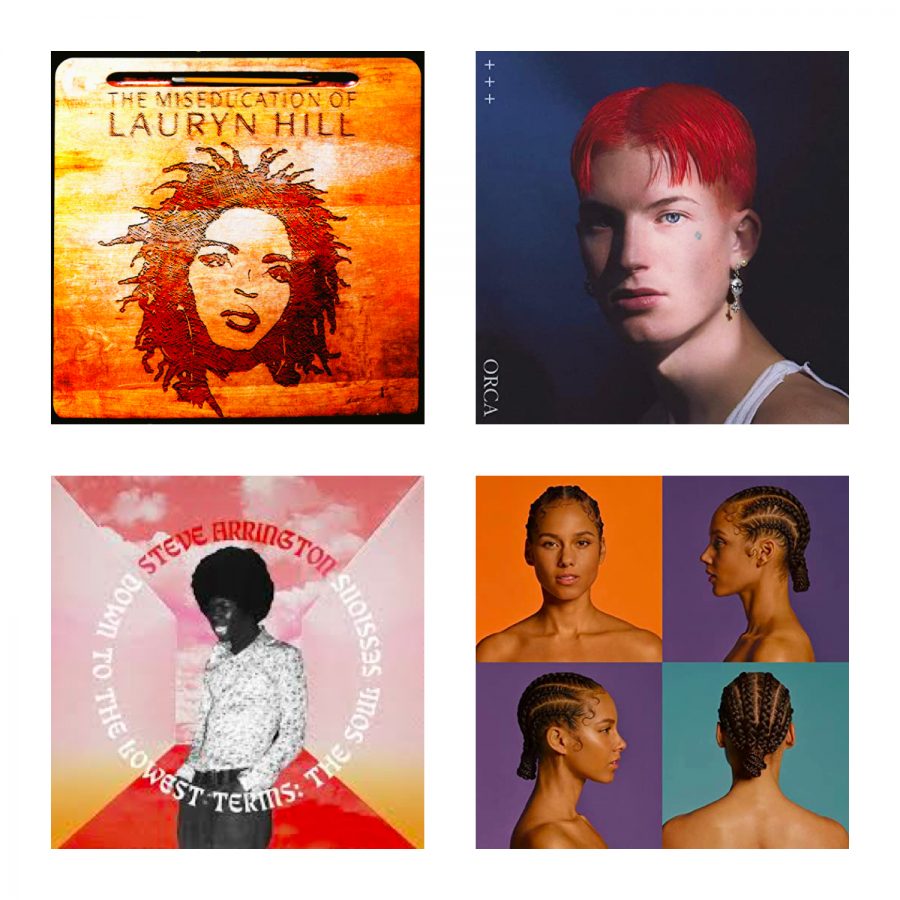The New Music Corner Features Alicia Keys, Gus Dapperton, Among Others
NEW MUSIC CORNER VOL. 2: ALICIA KEYS, GUS DAPPERTON AND MORE
BY: Jonah Rebert
Welcome to the second issue of the New Music Corner, one of the Ram’s newest columns exploring the past weeks’ releases and revisiting some of my all-time favorites.
NEW RELEASES:
“ALICIA” by Alicia Keys
Genre: Pop/R&B, Neo-Soul
After nearly six months of delays caused by various complications from label troubles with RCA records to the coronavirus pandemic, Alicia Keys’ long-awaited seventh studio album, “ALICIA,” was released this past Friday. The critically acclaimed singer, songwriter and pianist reverted to her earliest style, reflective of her debut project “The Diary of Alicia Keys.” Signature piano ballads and bass-driven free-form R&B classics highlight her musical strengths; however, each track varies. Each contains unique instrumental influences, providing a more eclectic feel than Keys’ more recent albums. Keys, and her husband Swizz Beats and Ludwig Goransson, award-winning composer for the “Black Panther,” handle production with a diverse selection of features such as Khalid, Jill Scott, 21 Savage and Snoh Aalegra. For much of her career, Keys has described her music as “genreless,” seemingly because of her desire to evoke an emotional response from each melodic selection rather than prioritize a specific conformed style. Although the project lacks some emphatic hooks from her earlier years, Alicia Keys’ first release since 2016 is a complete encapsulation of her laid-back, classic music, receiving widely positive reviews and mainstream success.
“Down to the Lowest Terms: The Soul Sessions” by Steve Arrington
Genre: Contemporary Funk/Soul
In March, long-time drummer for the group Slave, and legendary funk/soul vocalist, Steve Arrington, turned 64 years old. Although the charismatic singer may seem past his prime, his project’s release embarks on another chapter in his roller coaster of a musical career. Arrington joined Slave in 1978 after two of their funk-disco fusion albums had peaked in the Hot 100 charts. Towards the mid-’80s, Arrington became dissatisfied with the group’s studio sessions and lack of creativity, triggering him to start Steve Arrington’s Hall of Fame, a band known for hard-hitting, funky basslines that have since been sampled by top artists like Jay-Z and N.W.A. However, Arrington found himself uncomfortable with his career path before turning to God and becoming a licensed minister by 1990. This created his 19-year absence from the music industry. Since then, Arrington has incorporated many refined modern instrumentations and smoothly rides along each track with remarkable chemistry and cohesion. Every vocal performance is mesmerizing.While accompanied by various rising stars of the current funk, soul and jazz industries, the project is Arrington’s attempt to pass the baton unto a new generation that hopefully continues the legacy of one of the founding fathers of funk.
“Orca” by Gus Dapperton
Genre: Indie Pop, Bedroom Pop
Bedroom pop superstar Gus Dapperton burst onto the scene with a series of EPs in 2018, strongly identifying with every aspect of Gen Z culture through his trendy, synth-infused music and his unique, alternative aesthetic. All of “Orca” is a reflection of these sentiments. From bouncy, up-tempo hooks on tracks like “My Say So” to lyrical portrayals of youthfulness and defiance on “Grim,” the album sounds like a mix of a Disney movie soundtrack and classic coffee house alternative hits. Further accompanied by a wider instrumental range, the 23-year old’s vocal confidence seems to have grown from his previous work. Songs such as “Antidote,” my personal favorite off the album, show complex and profound technical ability. Regardless, one of the fundamentals of bedroom pop is simplicity. Dapperton frequently works alone, writing, producing, mixing and vocalizing every one of his songs and finding tremendous peace and creativity in solitude. Personal exploration allows Dapperton to understand better himself and the material he is creating. “Orca” is a promising sophomore release from an aspiring artist still experimenting with sound and technique while showcasing his summery hits on one of the better indie releases of 2020.
WHAT I’M LISTENING TO:
“The Miseducation of Lauryn Hill” (1998) by Ms. Lauryn Hill
Genre: Neo-Soul, Hip-Hop
Everyone has different standards for a “perfect” album. Lyrical substance, thematic content and accompanying instrumentation all factor into one’s definition of a classic, timeless project that bravely breaks the normal constructs of genre and style while remaining undeniably popular. For me, “The Miseducation of Lauryn Hill” is that album. Coming at a turning point in hip-hop — when Nas reigned as king of the East Coast, the Soulquarians were introducing a new style, and gangsta rap was losing its edge — Lauryn Hill came with a spiritually driven, conceptually juxtaposed masterpiece that would redefine the genre by combining motown, reggae and soul sounds. Her focus was on educating those listening to her message on various topics,and all centered around her life as a young Black woman. The flashy battle rap intro “Lost Ones” deals with her professional and romantic breaks with former Fugees member Wyclef Jean. At the same time, the tender, doo-wop influenced “To Zion,” is a song about learning to love her unborn child as she loves God. The difference between these songs, among others, shows the thematic arch of the project: Lauryn’s attempt to learn how to love those closest to her. The album dominated the ’99 Grammy’s, winning five awards during the night, making Hill the first woman to do so while also being the first hip-hop artist to take home “Album of the Year” honors. “The Miseducation of Lauryn Hill” did much more than solidify Lauryn Hill as a legendary MC; it showed how the deepest emotions within one’s soul, filled with beauty amidst heartache and pain, could all be represented in hip-hop.








































































































































































































